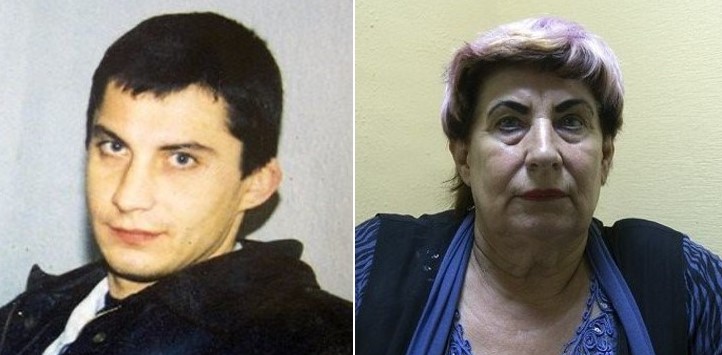Ukraine ordered to pay massive damages over police killing and cover up

The European Court of Human Rights has found Ukraine in violation of the right to life over the death of Volodymyr Kutsenko from police torture and lack of medical care, and then over the failure to carry out an effective information. The application was lodged by the young man’s mother, Nina Kutsenko who had suffered torment over years, first in trying to find her son, and then in seeking answers and accountability from those responsible for his death. She has been awarded a massive 72 thousand Euros in what the Ukrainian Helsinki Human Rights Union, who represented her, hopes will serve as a lesson to the authorities.
Article 2 of the European Convention on Human Rights obliges member states to protect the right to life and to effectively investigate all deaths caused by the State. Ukraine failed Volodymyr Kutsenko and his mother on both accounts.
UHHRU’s Oleh Shynkarenko explains that Volodymyr Kutsenko disappeared on August 13, 2003. His mother began searching for him within days, and was initially given misleading information by Volodymyr’s much older lover. The latter claimed that she hadn’t seen him for two weeks, whereas, in fact, she had seen him in the police station on the night of August 12.
He had been taken in because the police were looking for a person who had carried out an armed attack on a banker. There were no direct grounds for suspecting Kutsenko, but he had earlier served a two-year sentence for hooliganism, and he had also had conflict with another person – Oleksandr Kushch, whom the police took an interest in.
The police pulled Kutsenko in on August 12, and tried to beat a confession out of him. They went too far, and, fearing an investigation if he died in police custody, they left him, unconscious, on the street in Vasylkiv. Residents called the police to no avail, and it was a full two days before an ambulance arrived and took him to hospital.
Nina Kutsenko still had no idea where her son was, and had lodged a formal report with the police on August 18. At that time, he was recovering from his injuries in hospital
On August 22, however, the police arrested Kushch, and also abducted Kutsenko from hospital.
Kutsenko presumably refused to ‘confess’ to a crime he hadn’t committed, and the police in the Vasylkiv police station kept beating him for three days. They again stopped only when he was unconscious, at which point they drove him to Fastiv and just left him outside. This time, they apparently called an ambulance and Kutsenko was again taken to a hospital in Fastiv.
They had gained no ‘confession’ from him, while on August 26, Kushch said that he had committed the attack, naming other accomplices, and not Kutsenko.
The story is harrowing, and only gets worse, since the hospital staff did not provide him with proper care. The advice of a neurosurgeon to seek a more comprehensive examination of his condition was simply ignored.
Volodymyr Kutsenko died on September 3, 2003, and was buried as a person whose identity was unknown, and as having died from drug abuse.
Nina Kutsenko only learned of her son’s death on September 9. Since then she has worked tirelessly to find out what happened, and to seek liability for those implicated.
The Court notes that there was some degree of an investigation. The Prosecutor General’s Office initiated criminal proceedings in October 2003, but these were to continue over the next 13 years, with the investigator changing at least 20 times.
Certain individuals did face criminal charges: the police officer who caused Kutsenko’s injuries; another officer who watched the beating without reacting; the doctor who failed to send Kutsenko for the required examination and take proper measures; the medical examiner who lied about the cause of death and omitted details of his injuries; as well as the officer in charge of the search after Kutsenko was reported missing.
Not one of them served a prison sentence as the charges against them were all time-barred.
Nina Kutsenko had won several civil claims, yet most of the money awarded was not paid.
The Court on July 18 agreed with Nina Kutsenko that her son’s death had been due to his beating by the police and by the lack of proper medical treatment, and that the failure to properly investigate his death constituted a further violation of Article 2.
Ukraine must pay 72 thousand in compensation and a further 2,786 euros in costs and expenses.
Lessons learned?
The Ukrainian authorities spent 13 years failing to investigate this crime. The story is truly shocking, but it cannot be called an isolated case. Where men die in police custody, there usually, though not always, are investigations and people are prosecuted. In other cases, human rights groups have helped applicants receive compensation for torture or ill-treatment via the European Court of Human Rights.
There are also, however, a number of people serving life sentences for crimes they almost certainly did not commit, with torture very often having been used to obtain confessions. One of the men whose life sentence was solely based on the suspect confessions of other men, Oleksandr Rafalsky, died still in prison. Others, whose cases equally warrant a judicial review which could well result in their release, remain imprisoned because politicians are dragging their heels on the relevant draft bill No. 2033a
See: Why do Ukrainian MPs want to prove that Ukraine is just like Russia?





